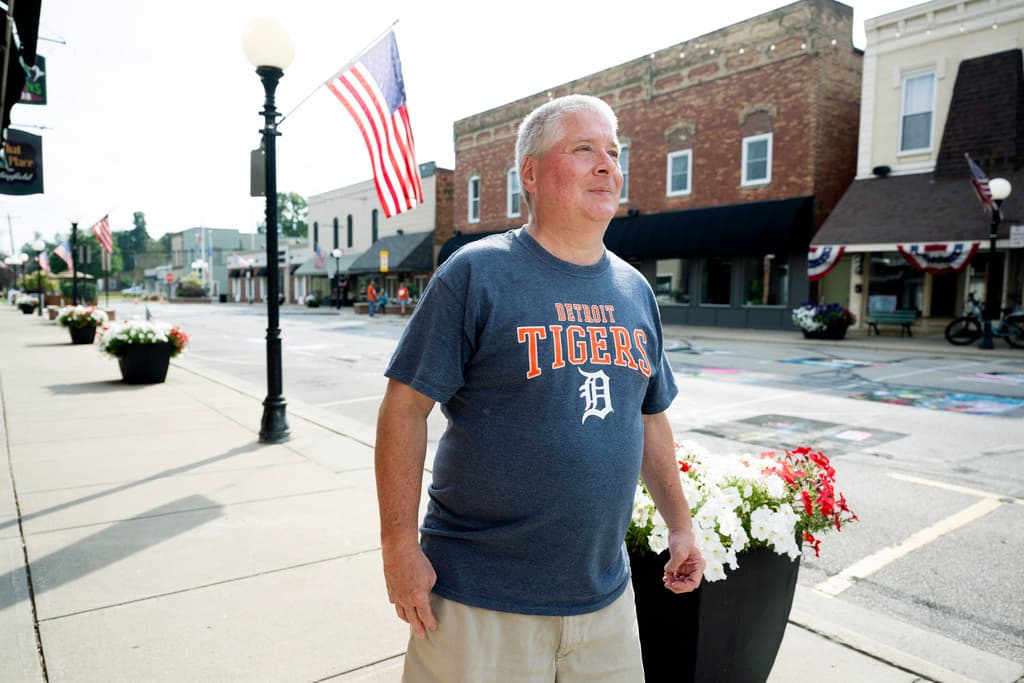She must show that she is above personal attacks, which Trump is engaged in. I want both to focus on policy issues.
Glenn Newlin looks out over the flag-adorned main street of his hometown Blissfield with a determined expression. It has only been a few months since he "came out" through the organization Republican Voters Against Trump (RVAT) – Republican voters against Trump. During the autumn election campaign, his face will adorn posters in Michigan, where the opinion polls between Harris and Trump are very even. And on RVAT's website, there is a testimony from Newlin, where he criticizes the former president's lack of respect for the US Constitution and his role in the deadly congressional storming on January 6, 2021.
He is not on a human level. I would never have a beer with him. He insults others and has broken the law, he says about Donald Trump.
Is courted
The stance makes him formally an independent middle-of-the-road voter – one of the few who are considered possible to influence in the polarized USA. The political campaigns are fighting over people like Newlin, especially in the swing states where the margin of victory can be made up of just a few thousand votes.
So what decides who gets Glenn Newlin's support?
I have always been a Republican. When I went to college, I was so inspired by Ronald Reagan that I wore a suit to school every day, he says.
I am a Christian and a conservative – I want low taxes and am against most abortions. But above all, I am a constitutionalist, our Constitution is important to me.
That's where it broke with Donald Trump. Voting for Joe Biden in the 2020 election didn't feel entirely right, admits Newlin – but still calls the president a gentleman.
That he dropped out makes my choice harder. But I don't think Harris is as left-wing radical as claimed. And I don't just want to write "Donald Duck" on the ballot.
Like many compatriots, he doesn't feel like he knows Harris yet, which is why this week's debate is important.
"Silent voters"
Newlin describes himself as a typical American. He is a middle manager at an insurance company, a football and basketball referee, and active in his church. He and his wife have two adult children and have lived in Blissfield for nearly 20 years. His home county, Lenawee County, is Republican red, but Newlin says that many acquaintances feel like his family: They worry about a second term with Trump and fear violence if he doesn't win the election.
Many here have become "silent voters". They dare not speak out and take a stand against Trump. Others take a stand for him. I try to encourage my neighbors to follow their conscience.
After President Joe Biden's dramatic announcement in July that he would not run for re-election, Vice President Kamala Harris became the Democratic presidential candidate. With her, the party's opinion polls have strengthened, currently having an average support of 48.1 percent compared to Republican Donald Trump's 46.3.
Before the leadership shift, Donald Trump had been ahead for months.
The USA's complicated electoral system, however, means that it's not always the one who gets the most votes who wins the election. In the USA, voters vote for electors. A state has as many electors as it has representatives in Congress, and the candidate who wins a state gets all the electoral votes there (except in Maine and Nebraska, where the electors are distributed proportionally).
This makes the result predictable in many places. The election is actually decided in a few so-called swing states where it is evenly balanced between Republican and Democratic majorities.
This year, the swing states are Michigan, Wisconsin, Pennsylvania, North Carolina, Georgia, Nevada, and Arizona. Before the Democratic leadership shift, Trump led in all of them, now Harris has gone ahead in several and in others, it's very even.
The presidential election will be held on Tuesday, November 5.
Source: Real Clear Politics
The presidential election in the USA is decided in a handful of so-called swing states, where it is evenly balanced between Democratic and Republican majorities. This is how Republican Donald Trump and Democrat Kamala Harris' support looks in percent in these states.
The number of electors in each state is in parentheses, to win the presidential election, support from at least 270 of the 538 electors is required.
Pennsylvania (19): Harris: 47.7; Trump: 47.2
Georgia (16): Trump: 48.3; Harris: 48.1
North Carolina (16): Trump: 47.9; Harris: 47.3
Michigan (15): Harris: 48; Trump: 46.9
Arizona (11): Trump: 47.9; Harris: 47.4
Wisconsin (10): Harris: 48.2; Trump: 46.8
Nevada (6): Trump: 47.6; Harris: 47.6
Source: Real Clear Politics compilation of current polls






